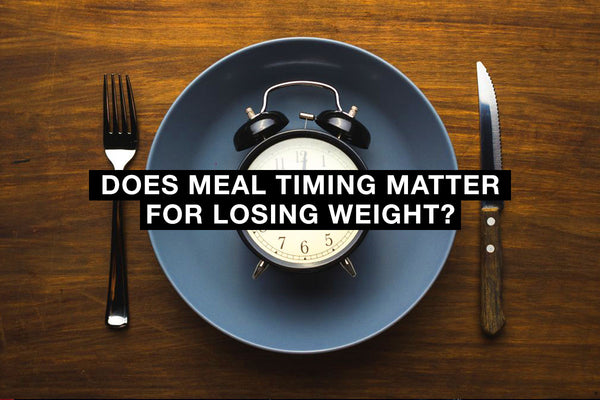When it comes to losing weight, you’ve likely heard conflicting opinions, making it hard to decide which advice to follow or whose recommendations to listen to.
One of the most commonly debated topics when it comes to weight loss centers around meal timing.
Some will have you believe that if you eat certain foods at certain times of day that you will lose fat faster than if you didn’t.
But, does meal timing really matter for losing weight?
Let’s find out!
What is Meal Timing?
Meal timing, also known as nutrient timing, is the planned intake of certain macronutrients at certain times of day to promote health, boost workout performance, and/or enhance body composition.
While that might sound pretty complicated, most of you reading this have already experimented with meal timing to one degree or another in the form of a post-workout protein shake or pre workout meal.
Both of these meals are consumed with the intention of supporting your workout performance, enhancing muscle recovery, and boosting results from training.
Meal Timing & Weight Loss
The body of literature investigating the effects on meal timing and weight loss is still in its infancy, and the results are mixed.
Some studies show that eating within a confined window may align better with an individual’s circadian rhythm, leading to better insulin sensitivity, lipid markers, and weight loss.[1]
Additionally, a 2017 study investigating the effects of meal frequency and timing on body mass concluded[2]:
“Our results suggest that in relatively healthy adults, eating less frequently, no snacking, consuming breakfast, and eating the largest meal in the morning may be effective methods for preventing long-term weight gain. Eating breakfast and lunch 5–6 h apart and making the overnight fast last 18–19 h may be a useful practical strategy.”
Another 2019 analysis concluded[3]:
“A regular meal pattern including breakfast consumption, consuming a higher proportion of energy early in the day, reduced meal frequency (i.e., 2–3 meals/day), and regular fasting periods may provide physiological benefits such as reduced inflammation, improved circadian rhythmicity, increased autophagy and stress resistance, and modulation of the gut microbiota”
These results would seem to suggest that meal timing does play a role in fat loss and that eating earlier and less frequently would help improve weight loss and metabolic health outcomes.
However, other research disputes these results.
For example, one study in overweight women noted greater weight loss when participants consumed most of their carbohydrates at dinner.[4]
Additionally, a 2017 study found no evidence that skipping breakfast resulted in worst outcomes related to body weight or metabolic parameters.[5]
So, where does this leave us?
Well, there are a few “core principles” that we can take away from these studies.
First off is that calories matter -- you have to be in a calorie deficit to lose weight. This is non-negotiable. Weight loss/gain is a function first and foremost about calories in vs calories out. If you don’t have this taken care of, you can forget about everything else that follows.
Second is sustainability -- the diet or meal timing pattern you’re following must be something that you can stick to for a decent amount of time for it to work.
You can have the most perfectly optimized diet for your age, gender, blood type, and ice cream preference, but if you don’t enjoy eating at certain times of the day or hate certain foods on the diet, then your chances of sticking to the diet are slim to none.
For a diet to be successful long-term, it has to be something you can easily do, day in and day out.
Third is consistency. Simply being in a deficit every now and then isn’t enough to guarantee consistent, meaningful weight loss. To lose weight, you need to consistently be in a calorie deficit (day after day).
Moreover, the human body craves consistency. It is much easier to stick to a diet if you follow it 100% each day of the week than just picking and choosing days to be in a deficit at random. Creating habits, regimens, and patterns help keep you organized and focused. It also eliminates much of the mental strain and guesswork that can come with a lack of planning and consistency.
Fourth is food quality.
Yes, you can technically lose weight eating nothing but twinkies, french fries, and ho-ho’s so long as you’re in a calorie deficit at the end of the day.
But, what is the “quality” of weight loss, and what ramifications is a diet overly bloated with hyper-processed food having on your metabolic health?
Consuming certain foods like those high in protein and fiber can do a better job of keeping hunger in check than packaged and processed goods (which are typically low in protein and fiber, and manufactured to make you crave them non-stop).
Fifth is how you’re eating.
Research has shown that distracted eating (i.e. eating while watching TV, texting, scrolling through social media feeds, etc.) increases calorie intake at mealtime as well as subsequent meals during the day.[6,7]
To help keep a better gauge of how many calories you’re actually consuming at mealtime (and throughout the day), it helps to be attentive, present, and mindful. Focus on the food you’re eating. Savor each bite, and enjoy the company and conversation of those at the table with you. This also helps you to eat slower, which allows your brain time to understand that it’s had enough to eat.
After addressing those five points, you can then start to consider meal timing.
If restricting your meals to a certain timeframe during the day (a la intermittent fasting) helps you adhere to your diet plan and remain in a calorie deficit, then you can experiment with it meal timing. Or if you have certain performance goals, meal timing can also be an option to consider.
But in the grand scheme of things, meal timing doesn’t play as much of a role in weight loss as you might think it does (or been led to believe).
Does Meal Timing Really Matter for Losing Weight?
Overall, meal timing isn’t particularly important for most people trying to lose weight.
What we mean by that is that simply eating your meals at certain times of the day doesn’t automatically result in fat loss or muscle gain.
The total amount of calories you’re eating each day plays a far larger role in whether you lose fat or not than what time you eat or how many times you eat per day.
Basically, as long as you are in a calorie deficit at the end of the day, you will lose weight, regardless of when you choose to eat.
Now, this doesn’t mean that meal timing is worthless.
In certain situations, such as individuals who compete in multi-hour events or competitions, meal timing and nutrient timing are critical.
However, for the average person or dedicated fitness enthusiast (like those who enter our transformation challenges), meal timing is not something with which you need to overly concern yourself.
So long as you’re hitting your calorie and macronutrient targets for the day and training hard, you will lose weight and achieve the results you want.
And, if you need help estimating how many calories you need to lose weight (or build muscle), click here to view our TDEE calculator.
Remember to focus on consistency, daily calorie intake, food quality and sustainability (how easy is the diet to adhere to over the long term).
Once you’ve gotten the basics down and run a few successful fat loss cycles, then you can explore more advanced nutrition and training tactics like nutrient timing.
References
- Sutton EF, Beyl R, Early KS, Cefalu WT, Ravussin E, Peterson CM. Early Time-Restricted Feeding Improves Insulin Sensitivity, Blood Pressure, and Oxidative Stress Even without Weight Loss in Men with Prediabetes. Cell Metab. 2018;27(6):1212-1221.e3. doi:10.1016/j.cmet.2018.04.010
- Kahleova H, Lloren JI, Mashchak A, Hill M, Fraser GE. Meal Frequency and Timing Are Associated with Changes in Body Mass Index in Adventist Health Study 2. J Nutr. 2017;147(9):1722-1728. doi:10.3945/jn.116.244749
- Paoli A, Tinsley G, Bianco A, Moro T. The Influence of Meal Frequency and Timing on Health in Humans: The Role of Fasting. Nutrients. 2019;11(4):719. Published 2019 Mar 28. doi:10.3390/nu11040719
- Sofer S, Eliraz A, Kaplan S, et al. Greater weight loss and hormonal changes after 6 months diet with carbohydrates eaten mostly at dinner. Obesity (Silver Spring). 2011;19(10):2006-2014. doi:10.1038/oby.2011.48
- Zhang L, Cordeiro LS, Liu J, Ma Y. The Association between Breakfast Skipping and Body Weight, Nutrient Intake, and Metabolic Measures among Participants with Metabolic Syndrome. Nutrients. 2017;9(4):384. Published 2017 Apr 14. doi:10.3390/nu9040384
- Robinson E, Aveyard P, Daley A, et al. Eating attentively: a systematic review and meta-analysis of the effect of food intake memory and awareness on eating. Am J Clin Nutr. 2013;97(4):728-742. doi:10.3945/ajcn.112.045245
- Ogden, J., Oikonomou, E., & Alemany, G. (2017). Distraction, restrained eating and disinhibition: An experimental study of food intake and the impact of ‘eating on the go.’ Journal of Health Psychology, 22(1), 39–50. https://doi.org/10.1177/1359105315595119






